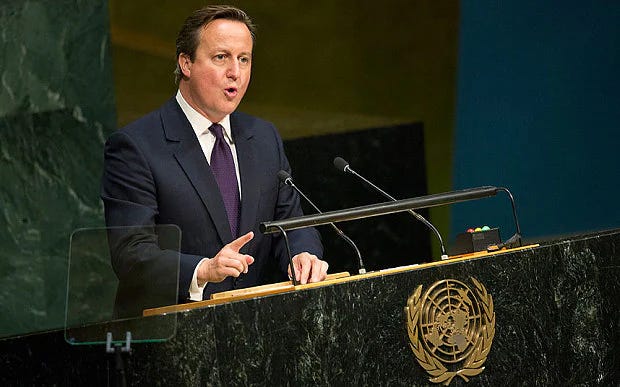This nondescript image shows one of the most pivotal events in UK history. And nobody ever talks about it!
The legal framework surrounding the UK’s involvement in Agenda 21, which was adopted at the 1992 United Nations Conference on Environment and Development (UNCED, or the Rio Earth Summit), was grounded primarily in international law, political agreements, and domestic policies rather than formal domestic legislation at the time.
Key Aspects of the Legal Framework:
International Treaty Obligations
Agenda 21 itself was not called a treaty, meaning it did not require formal ratification by the UK Parliament. Instead, it was an international agreement, adopted by the UK as part of its broader commitment to sustainable development.
The Rio Earth Summit (1992) also resulted in two binding international treaties, both of which the UK, represented by PM John Major, signed and ratified:
United Nations Framework on Climate Change (UNFCC) - which laid the groundwork for future climate agreements, including the Kyoto Protocol and the Paris Agreement.
Convention on Biological Diversity (CBD) - aimed at conserving biodiversity, sustainable use of resources, and equitable sharing of genetic resources.
The UK’s participation in these treaties provided a legal framework for implementing sustainable development strategies, which aligned with the principles of Agenda 21.
On the back of this the UK government published its own sustainable development strategy in 1994, titled “Sustainable Development: The UK Strategy,” which aligned with the objectives of Agenda 21. This document was designed to guide national policies toward sustainability and incorporated local government involvement as suggested by Agenda 21’s focus on local action plans (Local Agenda 21).
The Local Government Act 1999 introduced the duty for local councils to secure continuous improvement in the way their functions were exercised, which aligned with the sustainability principles of LA21. Although LA21 initiatives were voluntary, this act later provided a framework for councils to pursue sustainable development more formally.
Integration of European Union Law and International Law into UK Law
As a member of the European Union (EU) at the time, the UK was also subject to EU environmental directives that aligned with the goals of Agenda 21. Many of the UK's regulations in the 1990s were influenced by EU law, which is grounded in the communitarian principle that ‘rights come with responsibilities’, and led to the enactment of the Human Rights Act 1998.
The UK's adoption of the UN Agenda 2030 for Sustainable Development, which encompasses the 17 Sustainable Development Goals (SDGs), occurred within a well-established legal and policy framework that built upon previous international commitments, national policies, and legislative measures. Under David Cameron's leadership, the UK signed up to Agenda 2030 in September 2015 at the UN Sustainable Development Summit in New York.
Agenda 2030, similar to Agenda 21, is officially a non-binding international agreement. However, the UK government has expressed its full commitment to Agenda 2030 by incorporating its principles into existing legal, policy, and governance frameworks.
Here is a breakdown of the legislation introduced by various UK governments since agreeing to global commitments that began in 1992, none of which you were consulted about or would have seen mentioned in any manifesto:
1 - Local Agenda 21 (LA21) 1992 (Major)
Though not an official act at this point (this came later with the Local Government Act 2000) the UK government strongly advised that local authorities take steps to implement Agenda 21 locally, as recommended in Chapter 28 of the document: Earth Summit Agenda 21 – The United Nations Programme of Action From Rio
Most local authorities integrated this into their local plan.
Stated goal: Introduce policies for Sustainable Development.
Communitarian aspect: Global to Local and focus on the global collective good.
Real goal: Build governance structures which bypass national democracy.
1997 – “Change” New Labour comes in
2 - Human Rights Act 1998 (Blair)
Stated goal: Incorporate the European Convention on Human Rights into UK law.
Communitarian aspect: Balances individual rights with collective responsibilities, often requiring courts to consider the impact of individual behaviour on the wider community (e.g., in cases concerning public safety or freedom of expression).
Real goal: Transition of UK Laws on human rights away from inalienable rights centred around the individual, towards rights that come with responsibilities centred around the common good.
3 - Local Government Act 2000 (Blair)
Stated goals: Give councils the power to promote the social, economic, and environmental well-being of their communities by increasing community and public engagement.
Communitarian aspect: Enabling local authorities to take action in the best interest of their communities, encouraging community involvement in local decision-making. Remember they speak for the community not you.
Real goal: Force and speed up implementation of Agenda 21.
4- Health and Social Care Act 2001 (Blair)
Stated goals: Modernising the National Health Service (NHS) and social care services in England and Wales.
Communitarian aspect: Private sector acting on behalf of the community creating a democratic deficit in healthcare decision-making.
Real goal: The Act laid the groundwork for expansion of Public-Private Partnerships (PPPs) and the creation of NHS Foundation Trusts, which were intended to give hospitals more financial autonomy and the ability to enter into partnerships with private companies.
5 - Education Act 2002 (Blair)
Stated goal: Raising Standards and Improving Accountability
Communitarian aspect: It promoted local control through collaborative governance, and shared responsibility for education and community well-being. It encouraged schools to act as community hubs, supporting not only the academic success of students but also the social and emotional health of the wider community.
Real goal: Pave the way for the Education and Inspections Act 2006 which would allow schools to collectivise.
6 - Children Act 2004 (Blair)
Stated goal: Built on the Children Act 1989, it introduced measures to improve the well-being of children, including safeguarding and protecting children's rights through community services.
Communitarian aspect: Promotes collective responsibility for the welfare of children, collaboration between local authorities, schools, and health services to protect children and promote their development.
Real goal: Allow more legal power for the local authorities to override the wishes of parents.
7 - Education and Inspections Act 2006 (Blair)
Stated goal: Promoting Parental and Diversity of School Provision.
Communitarian aspect: Allowed for more central control through the collectivising of schools under ‘Federations’ or ‘Trusts’.
Real goal: Through the collectivisation and increased control of Trust CEOs, the integration of Agenda 21, and later SDG 4, into curriculums becomes easier.
8 - Legislative and Regulatory Reform Act 2006 (Blair)
Stated goal: To simplify the legislative process, reduce regulatory burdens, and improve the overall regulatory framework in the UK.
Communitarian aspect: Bypass democracy through governance structures.
Real goal: This act significantly expanded the use of Statutory Instruments to make legislative changes without requiring full parliamentary debate, particularly in areas such as administrative and regulatory reforms. It enabled secondary legislation to be introduced after a bill had already been passed.
9 - Sustainable Communities Act 2007 (Blair)
Stated goal: Encouraged local councils and communities to work together to promote the sustainability of their areas.
Communitarian aspect: Emphasised localism, allowing communities to have a direct say in shaping their environments, improving services, and tackling environmental and social issues.
Real goal: Tokenistic in community engagement. Councils steered to implement Agenda 21.
10- The Climate Change Act 2008: (Brown)
Stated goal: To align with SDG 13 (Climate Action) as the cornerstone for the UK's climate policy.
Communitarian aspect: Bypass democracy through governance structures.
Real goal: This Act created a legally binding framework for the UK’s transition to a low-carbon economy, setting targets for reducing greenhouse gas emissions.
11 - Localism Act 2011 (Cameron)
Stated goal: Devolved greater powers to local authorities and communities, promoting a "Big Society" agenda.
Communitarian aspect: Fostered community engagement to have greater control over planning, housing, and local services. It emphasised community-led initiatives, such as neighbourhood planning and community rights.
Real goal: Allowed change agents to infiltrate and drive local issues in-line with Agenda 21.
12 - The Crown Act 2013 (Cameron)
Stated goal: To improve the management and regulation of the Crown Estate and the Crown Estate Commissioners in the UK.
Communitarian aspect: Reform the management of the Crown Estate, with the structure to engage with local communities, and modernise operations. These objectives are steered by the Crown Estate Commissioners.
Real goal: More power to Crown Estate Commissioners to implement environmental sustainability, Agenda 21.
David Cameron at the UN Sustainable Development Summit in New York, September 2015. Like Major before him, without any consent from the British public or parliamentary debate, he re-affirmed the UKs commitment to achieve Agenda 2030’s 17 Sustainable Development Goals. The update from Agenda 21 is focused on creating more ‘partnerships’ to accelerate progress.
13 - Housing and Planning Act 2016 (May)
Stated goal: Addressed housing shortages and promoted homeownership.
Communitarian aspect: Included policies like Neighbourhood Planning, empowering communities to have more say over housing development and to address local needs collectively.
Real goal: The ‘Pay to Stay’ policy meant the erosion of tenant security. Promote property ownership not of individuals, but corporations.
14 - Coronavirus Act 2020 (Johnson)
Stated goal: To give the government emergency powers to manage the crisis including; imposing lockdowns, restrict public gatherings, close businesses, and close schools.
Communitarian aspect: The Act prioritised public health and safety over individual freedoms, promoting collective responsibility. Individual liberties were restricted, the Act reflected a broader commitment to the ‘common good’, ensuring that collective safety and public welfare took precedence during the crisis.
Real goal: Drive change in the area of public health policy in favour of the collective rather than the individual, effectively re-defining medical ethics. Lockstep policies were implemented around the world with national governments relinquishing power the World Health Organization.
15 - Agriculture Act 2020 (Johnson)
Stated goal: To reform agricultural policies following the country’s departure from the European Union.
Communitarian aspect: The welfare of the community and the environment is prioritised over individual, particularly small farmers, interests. The new government body, The Environmental Land Management (ELM) encourages farmers, through subsidies, to adopt methods that focus is on reducing carbon emissions and take land out of food production.
Real goal: Seize more power through The Environmental Land Management body to implement Agenda 2030 - SDG 15, Life on the Land.
16 - Environment Act 2021 (Johnson)
Stated goals: Aims to improve environmental protections, tackle air quality, and promote biodiversity.
Communitarian aspect: Set up new ‘governance’ structures like the Office for Environmental Protection.
Real goal: Setting legally binding targets driven by NGOs, think tanks and change agents to infiltrate and drive local issues in-line with Agenda 2030.
17 - Electronic Trade Documents Act 2023 (Sunak)
Stated goals: Aims to modernize the trade documentation process by facilitating the legal use of electronic trade documents, enhancing security, reducing costs and delays, and supporting global trade.
Communitarian aspect: The Act promotes practices that benefit big business over smaller businesses and proports to prioritise the common good and long-term sustainability for society as a whole.
Real goals: To facilitate the future introduction of digital IDs. Reduced personal privacy.
18 - The Online Safety Act 2023 (Sunak)
Stated goals: Protect Children, Vulnerable Users and Combat Misinformation.
Communitarian aspect: This Act seeks to tip the balance of personal freedoms against the individual in favour of broader societal safety.
Real goals: Give government body OFCOM unprecedented powers to censor content ‘they’ define as harmful. More constraints on free speech.
Coming soon under Starmer’s Labour Government:
“Change” - that word again. It simply signifies more communitarianism. With Starmer, who is undeniably a globalist and a puppet of the Trilateral Commission, this shift will come faster than ever before. We must look beyond the distractions of manifesto pledges to uncover the true objectives of global governance.
Even many on his own side, ironically still trapped in the left right paradigm, have still raised concerns about his association with the Trilateral Commission. See article: The Crisis Of Democracy: Sir Keir Starmer And The Trilateral Commission - Labour Heartlands
Insightful analysis of the Labour election win from Windows on the World podcast:
Citizens Assemblies
Though not in its most recent manifesto many in the labour party are lobbying to establish a UK-wide Citizens’ Assembly on Climate and Environmental Justice, where citizens would be involved in shaping policies to reach net-zero emissions. The main advocates for this are The Labour for a Green New Deal, which proports to be a ‘grassroots movement’, and campaigns within the party. Prominent MP advocates include: Wes Streeting, Rebecca Long-Bailey, John McDonnell, and Clive Lewis.
Stated goals: To bring together a cross-section of the population to deliberate on important issues. The process encourages participants to move beyond individual or special interests and consider what is best for the community as a whole.
Communitarian aspect: The citizens assemblies will be steered by chosen government facilitators and ‘experts’ taking the assembly to a pre-determined outcome. Limit the solutions, control the outcome.
Real goal: Implement the policies of Agenda 2030 under the pretence of bottom-up democracy.
Universal Basic Income
Support for Universal Basic Income (UBI) within the UK Labour Party comes from several prominent figures, including Anneliese Dodds and Andy Burnham. It is particularly popular among the party’s left wing, especially those advocating for economic reform in response to the rise of AI threatening jobs.
Although UBI has not yet become official Labour policy, it has gained considerable attention and supported by many Labour MPs and ‘grassroots’ movements.
Stated goals: To reduce poverty, tackle economic inequality, and simplify the welfare system.
Communitarian aspect: UBI fosters collective well-being, social cohesion, and a sense of shared responsibility within society. 'Rights come with responsibilities.'
Real goal: To create a docile, compliant population dependent on the state. It is likely that a digital ID would be required to access UBI.
New Schools Curriculum
Within days of the new Labour government taking office, Starmer’s Education Secretary, Bridget Phillipson, appointed 'expert' Becky Francis to chair a review of Curriculum and Assessment. Becky Francis, CEO of the Education Endowment Foundation and a self-described feminist, is best known for her research on social identities and educational attainment, including gender, race, and social class. Can you see where this heading?
This review, currently out for consultation, will primarily involve contributions from educational think tanks rather than parents, and is expected to lead to a new education bill.
Stated goals: To raise school standards and support young people from all backgrounds to thrive. Update the national curriculum frameworks, change exam systems and assessment methods, and make alterations to school accountability measures.
Communitarian aspect: Promotes shared responsibility between schools, collective improvement, and community well-being, with decisions made by experts, not parents. Greater power will be given to OFSTED.
Real goals: Further centralisation of control and homogenisation of schools. Curriculums shaped by an overarching 'supra-curriculum'. Increased digital learning and assessment, alongside the introduction of Digital Learning Wallets.
Digital IDs
This is a key objective for Starmer and his globalist supporters. The Data Protection and Digital Information Bill has already passed through the House of Commons, clearly laying the groundwork for the future introduction of Digital IDs.
Identity verification is not a new concept in Britain, having been a central project of Tony Blair’s Labour government in the mid-to-late 2000s. Although it was scrapped by the Conservative-Liberal Democrat coalition in 2010, it now seems to be resurfacing under Keir Starmer’s leadership. Within 48 hours of Starmer becoming Prime Minister, Blair renewed calls for the introduction of Digital IDs through his influential think tank, The Tony Blair Institute for Global Change.
Stated goals: To streamline access to services by enabling individuals to prove their identity quickly, securely, and safely; and to reduce migration.
Communitarian aspect: To promote collective well-being the 'common good', and steer community behaviour through A.I. controlled access to services.
Real goal: To create a technocratic government and a corporate surveillance society. This is the true nature of the ‘change’ being pursued.
It is also extremely likely that Starmer will ratify the final draft of the WHO Pandemic Preparedness and Response treaty. Going against public opinion and enormously undermining national sovereignty.
So, can you think beyond the left right paradigm yet?
Do you still think we live in a democracy?
Thank you for taking the time to read and consider this information.











Fascinating if profoundly depressing piece. The dissembling of our alleged democracy. It's rinse and repeat-every crisis ushers in new authoritarian statutes.